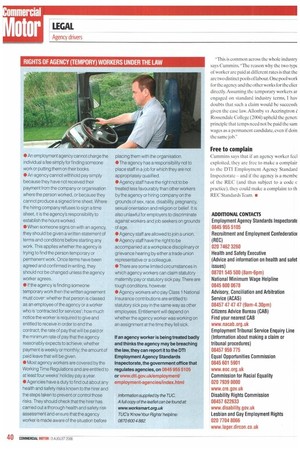• An employment agency cannot charge the individual a fee
Page 40

If you've noticed an error in this article please click here to report it so we can fix it.
simply for finding someone work or putting them on their books.
• An agency cannot withhold pay simply because they have not received their payment from the company or organisation where the person worked, or because they cannot produce a signed time sheet. Where the hiring company refuses to sign a time sheet, it is the agency's responsibility to establish the hours worked.
• When someone signs on with an agency, they should be given a written statement of terms and conditions before starting any work. This applies whether the agency is trying to find the person temporary or permanent work. Once terms have been agreed and confirmed in writing, they should not be changed unless the agency worker agrees.
• If the agency is finding someone temporary work then the written agreement must cover: whether that person is classed as an employee of the agency or a worker who is 'contracted for services': how much notice the worker is required to give and entitled to receive in order to end the contract; the rate of pay that will be paid or the minimum rate of pay that the agency reasonably expects to achieve; whether payment is weekly or monthly; the amount of paid leave that will be given.
• Most agency workers are covered by the Working Time Regulations and are entitled to at least four weeks' holiday pay a year.
• Agencies have a duty to find out about any health and safety risks known to the hirer and the steps taken to prevent or control those risks. They should check that the hirer has carried out a thorough health and safety risk assessment and ensure that the agency worker is made aware of the situatior before placing them with the organisation.
• The agency has a responsibility not to place staff in a job for which they are not appropriately qualified.
• Agency staff have the right not to be treated less favourably than other workers by the agency or hiring company on the grounds of sex, race, disability, pregnancy, sexual orientation and religion or belief. It is also unlawful for employers to discriminate against workers and job seekers on grounds of age.
• Agency staff are allowed to join a union.
• Agency staff have the right lobe accompanied at a workplace disciplinary or grievance hearing by either a trade union representative or a colleague, • There are some limited circumstances in which agency workers can claim statutory maternity pay or statutory sick pay. There are tough conditions, however.
• Agency workers who pay Class 1 National Insurance contributions are entitled to statutory sick pay in the same way as other employees. Entitlement will depend on whether the agency worker was working on an assignment at the time they fell sick.
If an agency worker is being treated badly and thinks the agency may be breaching the law, they can report it to the DTI Employment Agency Standards Inspectorate, the government office that regulates agencies, on 0845 955 5105 or www.dti.gov.uk/employment/ employment-agencies/index.html
information suppliecl by the TUC.
A full copy of the leaflet can be found at: www.worksmartorguk
TUG'S 'Know Your Rights' helpline: 0870 600 4 882.




























































































































































































